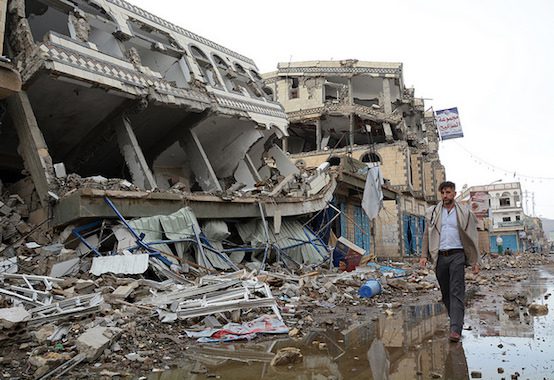Our Immoral and Irrational Yemen Policy

Nicholas Kristof has written an excellent column attacking U.S. support for the war on Yemen:
The United States is not directly bombing civilians in Yemen, but it is providing arms, intelligence and aerial refueling to assist Saudi Arabia and the United Arab Emirates as they hammer Yemen with airstrikes, destroy its economy and starve its people. The Saudi aim is to crush Houthi rebels who have seized Yemen’s capital and are allied with Iran.
That’s sophisticated realpolitik for you: Because we dislike Iran’s ayatollahs, we are willing to starve Yemeni schoolchildren.
It can’t be emphasized enough that U.S. policy in Yemen is both deeply immoral and irrational. Our government is a partner in war crimes and crimes against humanity ostensibly because of an exaggerated fear of Iranian influence, but even if the latter weren’t exaggerated there is no way to justify what is being done to the people of Yemen. U.S. interests are not advanced in the slightest by the coalition’s war, but any limited benefit would be outweighed by the horrifying costs imposed on a country whose people have done nothing to us. Destroying and starving Yemen does nothing to harm Iran (a dubious goal in itself), but it is inflicting massive suffering on tens of millions of people and destabilizing the entire area for years and possibly decades to come. Even if the worst-case scenario is avoided and millions don’t die from famine, widespread malnutrition has already devastated the health and development of an entire generation.
War supporters usually frame it as a way to combat supposed Iranian “expansionism,” but the Saudi coalition’s intervention is the reason for the modest increase in Iranian involvement since 2015. When that doesn’t work, they will claim that it has something to do with ensuring the security of international shipping, but there has been no Yemeni threat to shipping. Yemenis depend heavily on imports, so it would make no sense for them to threaten their own lifeline. The only impediment to normal commercial shipping in the area has been the coalition’s onerous blockade, which has done so much to create and then worsen the humanitarian crisis. The administration also claims that it is supporting the Saudis and Emiratis to help them “defend” themselves, but they aren’t acting in self-defense and they have actually made themselves less secure by intervening.
No competent strategist would endorse such a policy. No sane realist would agree with it. It is a policy born out of a toxic brew of threat inflation, knee-jerk support for “allies” that aren’t allies, and the usual ignorance of the local politics and history of Yemen, and the results are predictably horrible. The first step in ending this policy is for the House to vote for H.Con.Res. 138, the antiwar resolution introduced yesterday by Rep. Ro Khanna. It is imperative that Congress force the administration to withdraw U.S. support from the Saudi coalition’s bombing campaign. It will take a lot more to repair the damage done by the war that our government has enabled, but before that can happen the U.S. has to stop making things worse.
Comments